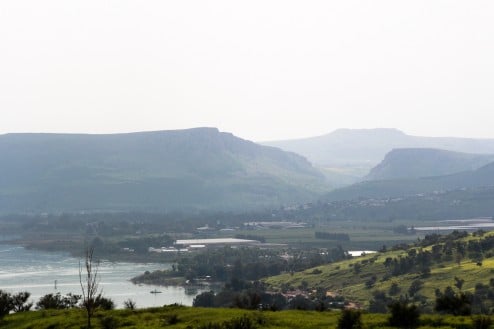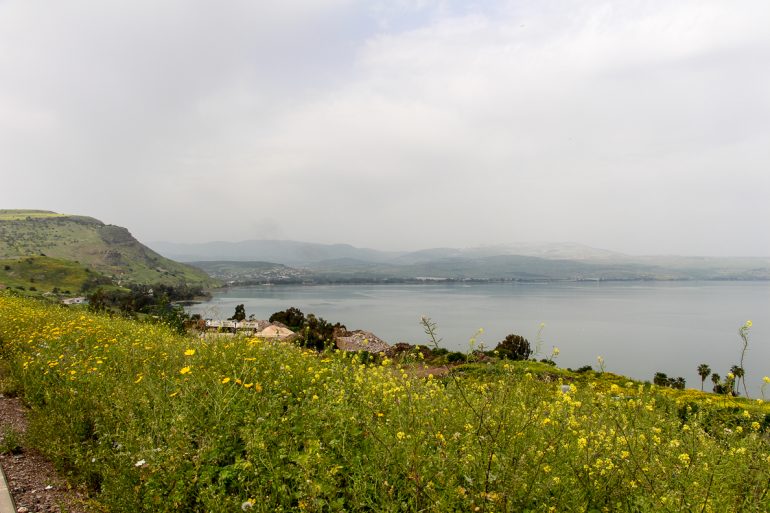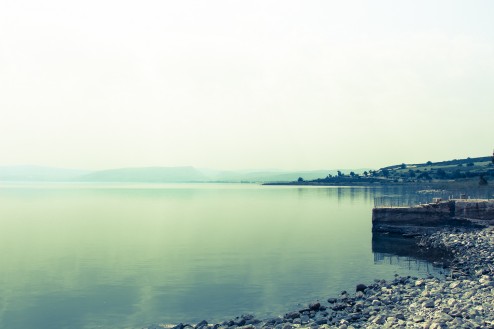According to the Gospels, Jesus’ childhood and young adulthood was in Nazareth, in the central Galilee along the northern edge of the fertile Jezreel Valley. However, we know virtually nothing about this early period of Jesus’ life. After his baptism, according to the gospels, Jesus made his home in the town of Capernaum, located on the north shore of the Sea of Galilee.
Capernaum comes from its Hebrew name, Kfar Naḥum, or the “Village of Nahum”. Today the Sea of Galilee is called Yam Kinneret (Lake Kinneret) in Hebrew and Buhayrat Tabariyya (Lake Tiberias) in Arabic. In the first century it also had numerous names, translated as: the Sea (or Lake) of Galilee, Sea of Tiberias, or Lake Ginneseret.

” . . . its nature as amazing as its beauty . . . “
Here is the first century historian Josephus’ description of the region around the lake and Capernaum:
“The country also that lies over against this lake hath the same name of Gennesareth; its nature is amazing as well as its beauty; its soil is so fruitful that all sorts of trees can grow upon it, and the inhabitants accordingly plant all sorts of trees there; for the temper of the air is so well mixed, that it agrees very well with those several sorts, particularly walnuts, which require the coldest air, flourish there in vast plenty; there are palm trees also, which grow best in hot air; fig trees also and olives grown near them, which yet require an air that is more temperate. One may call this place the ambition of nature, where it forces those plants that are naturally enemies to one another to agree together; it is a happy contention of the seasons as if every one of them laid claim to this country; for it not only nourishes different sorts of autumnal fruit beyond men’s expectation, but preserves them a great while; it supplies men with the principal fruits, with grapes and figs continually during ten months of the year, and the rest of the fruit as they become ripe together, through the whole year; for besides the good temperature of the air, it is also watered from a most fertile fountain. The people of the country call it Capharnaum.”
(Josephus, War 3.515–519)
Fertile for Revolution
Josephus further describes Galilee by tying together the fertility of the soil and a Galilean strength, courage, and willingness to fight:
“These two Galilees [Upper and Lower], of so great largeness, and encompassed with so many nations of foreigners, have always been able to make a strong resistance on all occasions of war; for the Galileans are enured to war from their infancy, and have been always very numerous; nor hath the country been ever destitute of men of courage, or wanted a numerous set of them; for their soil is universally rich and fruitful, and full of the plantations of trees of all sorts, insomuch that it invites the most slothful to take pains in its cultivation by its fruitfulness: accordingly, it is all cultivated by its inhabitants, and no part of it lies idle. Moreover, the cities lie here very thick; and the very many villages there are here, are everywhere so full of people, by the richness of their soil, that the very least of them contain above fifteen thousand inhabitants.”
(Josephus War 3.41–43)
There seems to be a connection between working the land and being willing to fight for it. Maybe farmers realize how much there is to lose: a value known by the requirement of daily care and earned by the “sweat of the brow.” Even today, there is a mystical connection between the soil and those who tend it. Farmers and gardeners love the land.
We know that one of the issues of conflict was that the Roman occupiers were taking the land, both by payment and force, and through taxation were essentially turning local inhabitants into share croppers for absentee landlords. One of the Dead Sea Scrolls, the Commentary on Habakkuk, sees prophetic fulfillment in these acts of the Romans (referred to as the Kittim):
“. . . they cross the plain, attacking and pillaging the cities of the land, for that is what it means when it says, “to seize dwellings not their own. Dire and dreadful are they; their law and their fame come from themselves alone” (Habakkuk 1:6b-1:7).
This refers to the Kittim, the fear and dread of whom are on all nations. By intention their only thought is to do evil, and in deceit and trickery they conduct themselves with all the peoples.
“Swifter than panthers their horses, faster than desert wolves. Their horses, galloping, spread out, from afar they fly like a vulture intent on food, all of them bent on violence, their faces ever forward” (Habakkuk 1:8–9a).
The Kittim, who trample the land with horses and with their beasts. From far away they come, from the seacoasts, to eat up all the peoples like an insatiable vulture. In anger and hostility and in wrath and arrogance they speak with all the peoples. (Habakkuk 1:9b).”
(1Qphab 3.1–14)
“You made humanity as helpless as fish in the sea, like something a worm could rule over. He draws them out, pulls them in with his net, gathers them with his dragnet. Therefore he sacrifices to his net . . . ” (Habakkuk 1:14–16).
This refers to the Kittim, and they added to their wealth by all their plunder like the fish of the sea. And when it says, “therefore he sacrifices to his net and burns incense to his dragnet” (Habakkuk 1:16a), this means that they sacrifice to their battle standards and that their weapons are what they worship. “For by them his lot in life is enriched and his food is wholesome” (Habakkuk 1:16b), means that they impose the yoke of their taxes—their “food”— on all the peoples yearly, thus ruining many lands.
“Therefore he keeps his sword always drawn to kill nations without pity” (Habakkuk 1:17).
This refers to the Kittim who destroy many people with the sword, including boys, adults, old men, women, and children. Even on “the child in the womb they have no mercy” (Isaiah 13:18).”
(1Qphab 5.12–6.12)
In addition, we know for first century Jews and descendants of Israelites, whether by family lineage or by conversion, the idea of “the Land” and its ownership was also more than simply one of agriculture. It was also based in an understanding of covenant, identity, and God’s faithfulness to God’s people. In this light other passages and texts from the scrolls describe a future but imminent cataclysmic battle in which the Kittim would be violently overthrown and removed from the Land. The oppressed would destroy the oppressors and regain their rightful place as inheritors of ha Aretz, the Land.
This is the context of Mary’s praise, as a young Judean girl living in Galilee, when she found that she was pregnant with the Messiah, where she proclaims:
“. . . he has brought down the mighty from their thrones
and exalted those of humble estate;
he has filled the hungry with good things,
and the rich he has sent away empty.He has helped his servant Israel,
in remembrance of his mercy,
as he spoke to our fathers,
to Abraham and to his offspring forever.”(Luke 1.52–55 ESV)
It is also this context that reveals why so many were both attracted to and troubled by some of Jesus’ teachings. In this reality the Beatitudes take on a gritty political and potentially revolutionary nuance, mentioning crushed spirits and mourning, “inheriting the land”, and hungering for justice. But Jesus adds elements of meaning that also went in unexpected directions. In Jesus’ teaching it is the meek who inherit the land, not the powerful (reminding his listeners of Psalm 37.11); and it is the peace-makers who are God’s sons, not the war-makers (as is the case with the “Sons of Light” in the Dead Sea Scrolls). Jesus declares:
“Fortunate are the impoverished in spirit,
for theirs is the kingdom of heaven.
Fortunate are those who mourn,
for they shall be comforted.
Fortunate are the meek,
for they shall inherit the land.
Fortunate are those who hunger and thirst for justice,
for they shall be satisfied.Fortunate are the merciful,
for they shall receive mercy.
Fortunate are the pure in heart,
for they shall see God.
Fortunate are the makers of peace,
for they shall be called sons of God.
Fortunate are those who are persecuted for the sake of justice,
for theirs is the kingdom of heaven.”(Matthew 5.3–10)
“. . . one violent war came upon us after another . . .”
Galilee was consistently the the location of violent rebellions, attempted revolutions, and claims to power. It was the region where the greatest resistance to Roman (and any foreign) power was fomented.
Around 4 BCE a Galilean name Judah rebelled against Herodian rule, and he and his followers fortified themselves in Sepphoris, a town just four miles from Nazareth. In retaliation the Romans (in support of their client king Herod) burned the city to the ground, crucified some of the citizens and sold the rest into slavery, and then, over a number of years, they rebuilt Sepphoris as a thoroughly Roman town.
In AD 6 when Judea became a Roman province (and was therefore subject to direct Roman rule and the corresponding full taxation as an occupied territory), another Galilean (also named Judah) began a movement of rebellion that would eventually turn into the Zealots and Sicarii (the “dagger men”) who fought against Rome throughout the first century.
“. . . yet there was one Judah . . . [who] became zealous to draw them to a revolt, who both said that this taxation was no better than an introduction to slavery, and exhorted the nation to assert their liberty . . . All sorts of misfortunes also sprang from these men, and the nation was infected with this doctrine to an incredible degree; one violent war came upon us after another, and we lost our friends, who used to alleviate our pains; there were also very great robberies and murders of our principal men. This was done in pretense indeed for the public welfare, but in reality for the hopes of gain to themselves; whence arose seditions, and from them murders of men, which sometimes fell on those of their own people (by the madness of these men towards one another, while their desire was that none of the adverse party might be left), and sometimes on their enemies; a famine also coming upon us, reduced us to the last degree of despair, as did also the taking and demolishing of cities; nay, the sedition at last increased so high, that the very temple of God was burnt down by their enemy’s fire.”
(Josephus Antiquities 18.4–10)
Though Judah was defeated, his sons (James and Simon) continued his revolutionary efforts, leading to the First Jewish War with Rome in AD 66-73. Notably, Josephus himself was head of the Galilean forces and fought against Rome in this war until he was captured in AD 67. It was in this conflict that the destruction of Herod’s Temple, which he described above, took place in AD 70.
Jesus would have been about 10 or 11 years old when Judah began his initial campaign of rebellion. The elements of violence and war were ever present throughout Jesus’ lifetime, and in this context it likely would have been difficult to be neutral on the issue of one’s relationship with Rome. Who you worked with and for, and whether they did business with the Romans or Roman sympathizers, would have mattered:
Do you pay your taxes? All of them? Why?
You’re going to whose house? The tax collector’s house?
Are you a sympathizer? Did you heal a servant of the Kittim? The servant of an officer who leads the very soldiers who occupy us and the land?
When the gospels contain passages referring to the “Herodians” or questions directed to Jesus about Caesar and taxes, these were not mere issues of political rhetoric and division like Democrats and Republicans debating here in the United States. These were matters of potentially picking sides in pre-existing conflicts that were often violent and deadly.
This was the world of Jesus.
This was the tense, beautiful context where he called his first disciples.
He showed them that salvation and the establishment of God’s kingdom doesn’t come in strength of arms, destruction of life, or shedding of blood. Instead, it comes through healing hands that restore lives by touching those with untouchable skin diseases, returning the ability to walk and move and feel to the crippled and paralyzed, bringing sight to blind eyes and noises to deaf ears, and giving life to dead sons and daughters.
Jesus taught that freedom doesn’t come through rallying messages of war and promises of liberty via violence, but through loving enemies, going the extra mile, giving the shirts off our backs, turning the other cheek.
It was in this fertile region and in people’s hearts that the seeds of the Kingdom were first planted, through tongue-in-cheek riddles and confusing mystery-stories about farmers and fields, kings and peasants, shrubs that grow into trees, and frantic women searching for coins or faithfully baking bread.
This was Galilee. Birthplace of revolutions.



Good stuff thanks for sharing
Hey, thanks!
I’ve made a couple of edits to it since you read it. If you get a chance, check it again and let me know what you think.